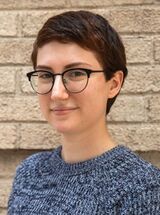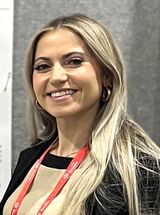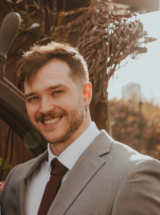Celebrating PGG Graduates
Please join us in our celebration as we highlight our PGG graduates.

Brandon Anderson
Mentor: Joshua Dunaief, MD, PhD
Thesis Title: Modeling retinal degeneration through oxidative stress and iron toxicity
Research and Lab Description: I investigated models of age-related macular degeneration and geographic atrophy in mice, using both chemical induction and knockout approaches. My work also examined how iron toxicity contributes to oxidative stress damage. Additionally, I explored potential treatments for oxidative stress–induced retinal degeneration, including iron chelation and AAV-mediated gene therapy.
Post PhD Plans: Currently working as a staff scientist at UPenn’s Kirby Center for Molecular Ophthalmology, with the goal of transitioning into industry-based ophthalmology research.

Alex Benton
Mentor: Daniel J. Powell, Jr., PhD
Blavatnik Family Fellowship Recipient
Thesis Title: Genetic engineering strategies for expanding the therapeutic index of chimeric antigen receptor cellular immunotherapies

Adrienne Jo
Mentors: Julie Blendy, PhD; Gregory Corder, PhD
Thesis Title: Midbrain µ-Opioidergic Neural Circuits Facilitate Negative Affect in Morphine Withdrawal
Research and Lab Description: In Drs. Julie Blendy and Greg Corder’s labs, I identified a neural circuit in the ventral tegmental area through which mu-opioid receptor-expressing neurons drive social deficits during protracted opioid abstinence.
Post PhD Plans: Neuroscience therapeutics investor at Palo Santo Fund

Jarrett Lindsay
Mentor: John Maris, MD
Thesis Title: Characterizing ALCAM as an oncoprotein and immunotherapeutic target in neuroblastoma

Sonia Lombroso
Mentor: Frederick “Chris” Bennett, MD
Thesis Title: Engineering Immune Cell Therapies to Treat Brain Diseases
Research and Lab Description: Microglia, the primary macrophage of the central nervous system, are highly specialized to meet the brains’ functional demands. In health, microglia maintain homeostasis by continuously surveying the brain parenchyma, detecting immune signaling, sensing ATP, influencing synapses, and responding to injury. Upon inflammation or injury, microglia can become dysregulated and contribute to disease pathology. While the underlying mechanisms of microglia dysregulation in many diseases are incompletely understood, even those we understand are difficult to treat due limited ability to directly target microglia. What if instead of trying to target each genetic component dysregulated in sick microglia, we could instead replace host microglia with healthy donor cells? This idea, termed microglia replacement therapy, involves depleting and subsequently replacing endogenous microglia with surrogate cells. In my thesis work, I studied the pivotal roles microglia play in neurological diseases and created new transplantation strategies to target microglia for cell-based interventions in neurological disorders. I addressed several roadblocks that previously limited the feasibility of microglia-based immunotherapies therapies. I created a high temporal resolution dataset detailing how microglia identity is programmed by the brain, identified several targets involved in programming microglial identity that warrant further study, created tools to replace microglia in safe non-toxic manners, and developed methods to deliver donor cells both intracranially and peripherally in a tissue specific manner. My hope is that the findings discovered during my Ph.D. will contribute to the expanding toolkit responsible for bringing microglia replacement therapies - and their transformative potential - closer to becoming a reality.
Post PhD Plans: Post-doc in Martin Kampmann's lab at UCSF

Kyla Mace
Mentor: Matthew Kayser, MD, PhD
Thesis Title: Cross-species investigation of hypersomnia genetics: a role for synaptic adhesion molecules
Post PhD Plans: Post-doc, Dept. of Psychiatry, University of Pennsylvania

Zoey Miller
Mentor: Robert J. Lee, PhD
Blavatnik Family Fellowship Recipient
Saul Winegrad Award for Outstanding Dissertation
Thesis Title: Investigating the Role of Bitter Taste Receptor 14 in Head and Neck Squamous Cell Carcinoma
Research and Lab Description: The Lee Lab studies GPCR signaling in the upper airway epithelium. I discovered that bitter taste receptor activation regulates apoptosis in head and neck squamous cell carcinomas through unique calcium signaling. Bitter agonist screening uncovered several clinically relevant compounds that activate bitter taste receptors, showing therapeutic potential.
Post PhD Plans: I am currently a postdoctoral fellow in Dr. Ed Morrisey's lab at Penn, where I utilize live imaging to study lung repair mechanisms following acute injury.

Ryan O'Connell
Mentor: David Weiner, PhD
Thesis Title: Development of novel bispecific T cell engagers for the immune targeting of carbonic anhydrase 9 in renal cell carcinoma
Post PhD Plans: Post-Doc., Center for Cellular Immunotherapies, University of Pennsylvania

Daniel Park
Mentor: David Weiner, PhD
Thesis Title: Development of Novel In-Vivo-Launched Multivalent T Cell Engagers for Targeting Intratumoral Heterogeneity in Glioblastoma Multiforme
Post PhD Plans: Scientist, Synthekine

Elizabeth Pruzinsky
Mentor: Daniel Kelly, MD
Thesis Title: The role of the nuclear receptor coregulator RIP140 in the control of muscle endurance fitness
Research and Lab Description: I conducted my dissertation research in Dr. Daniel Kelly's lab within the Cardiovascular Institute (CVI). Dr. Kelly's lab largely focuses on the molecular regulation of cardiac maturation and how this process is dysregulated in heart failure. Additionally, the lab also focuses on understanding the transcriptional regulation of the exercise training response in skeletal muscle. To this end, my dissertation research focused on a nuclear receptor coregulator, RIP140, and its control in muscle endurance fitness.
Post PhD Plans: Currently a post-doc at Cytokinetics in South San Francisco, CA.

Eric Waite
Mentor: Klaus Kaestner, PhD
Thesis Title: Generation of novel mouse models for the investigation of diabetes therapeutics
Research and Lab Description: In the Kaestner Lab, I worked on developing novel transgenic mouse models to advance diabetes therapeutics. The lab in general is interested in leveraging both transgenic mouse models and cutting-edge sequencing and imaging-based technologies to further our understanding of tissue development and disease states in the pancreas, intestine and liver.
Post PhD Plans: My post-PhD plans include a gap year to take care of the inheritance following the death of both my parents during the PhD and to travel. Ultimately, I plan to find a job in industry, ideally R&D focused on drug discovery/development.

Michael Zaleski
Mentor: Jacob Brenner, MD, PhD
Thesis Title: Developing nanoparticle formulations with biologic interactions in mind: Uncovering the effects of red blood cells and protein corona on nanoparticle function in vivo
Research and Lab Description: Jake Brenner's lab uses the tools of nanomedicine to engineer novel therapeutics. The specific goal of my work was to develop nano-scale drug delivery systems to treat acute critical illnesses. My work improved our understanding of how biomolecules (specifically red blood cells and complement proteins of the innate immune system) interfere with nanoparticle behavior after administration in vivo. I used this knowledge to rationally design nanoparticle formulations with improved functionality and reduced side-effects.
Post PhD Plans: Senior Scientist at Merck, working on Drug Product Development (formulation development) for vaccines

